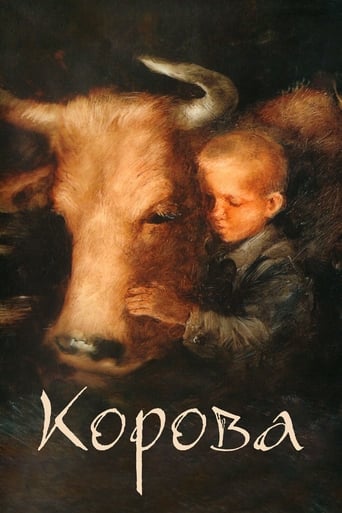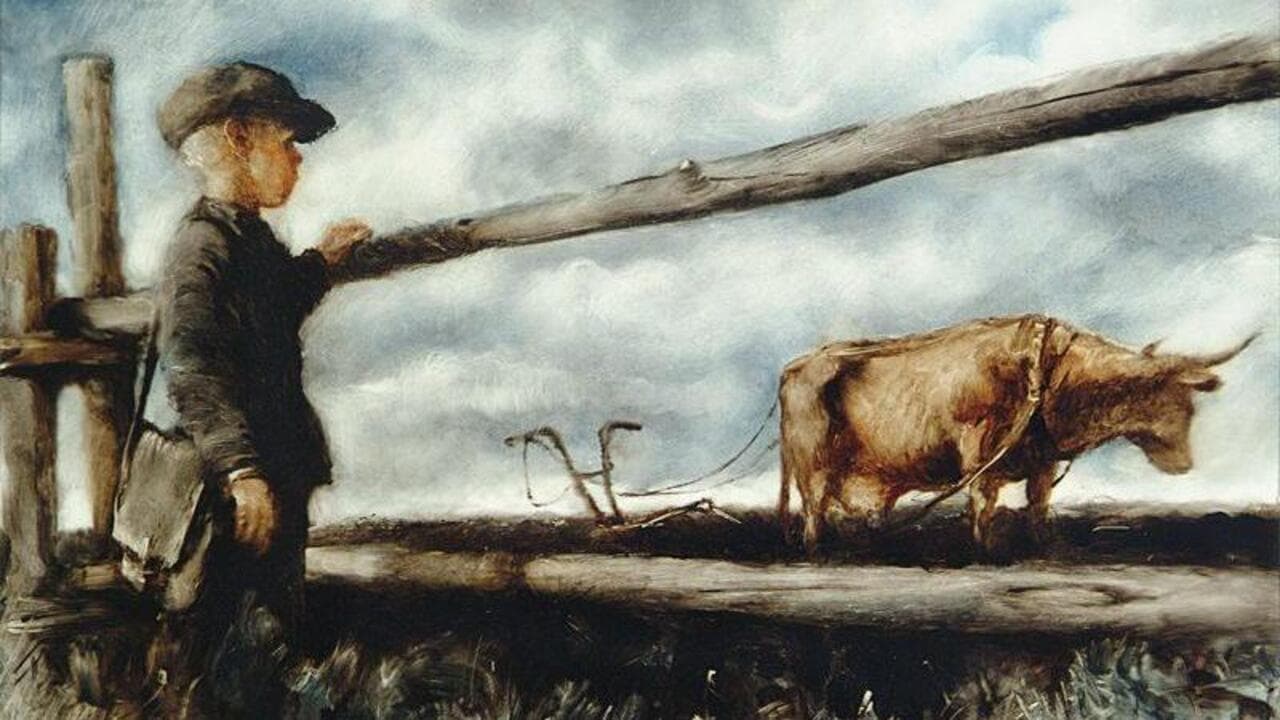Robert Reynolds
This is a short done by Aleksandr Petrov, done by painting directly on glass. There will be spoilers ahead:This short, which was nominated for the Academy Award for Animated short, losing to Balance, is an early short by Aleksandr Petrov. The story concerns a poor farming family and their son's remembrance of the family's cow.The cow gives birth to a calf at the start of the short (I love how the mother gets the calf to drink milk from a pail). The calf grows, but must be sold early due to the family's poverty. The cow grows discontent, balking at pulling the plow in the fields.The boy tries to console the cow, encouraging her to forget her calf and think of him as her son now. One day, the cow breaks free and runs off. Here, the short becomes dream-like, with part of it a flight of fancy in the boy's imagination and part of it all too grim reality, as the family loses their cow to tragedy.The short closes with the boy remembering the cow and everything it gave (literally and figuratively). It's absolutely beautiful visually, even as narratively it speeds to misfortune.This short has been on VHS and can be found online. Most recommended.
Rectangular_businessman
Words just cannot express all the astounding beauty and emotion that are displayed in all the shorts made by the Russian animator Aleksandr Petrov: In all his shorts, even the most ordinary things from everyday life can be turned into something exquisite through the magnificent animation style of this filmmaker."The Cow", his first short, is not the exception of this rule: In less than ten minutes, and almost without dialogue, Petrov is able to make an incredibly captivating tale, with an almost dream-like atmosphere, but which also has an intense feeling of sadness and nostalgia in every scene. The ending of this short is particularly heart-breaking, but at the same, is inspiring and fulfilling.I loved this short. It is a strong beginning for the equally strong filmography of Aleksandr Petrov, who is, in my opinion one of the greatest animator who ever lived.
MartinHafer
This is the story about a poor family's cow and a young child's attachment to it.I have admired the animated films of Aleksandr Petrov for some time, as they are terrific works of art come to life. Not surprisingly, he's won the Oscar for Best Animated Short Film and been nominated several more times (starting with this film). You just can't help not admiring all the time and effort put into making these lovely films. Apparently, he uses a technique where you paint on glass to make the animations and I have only seen one other artist do similar work (Martine Chartrand and her short BLACK SOUL). The quality of this 1989 piece is about on part with Ms. Chartrand's, though Petrov's newer works are even better--with much higher quality art work and more vibrant colors. While THE COW is lovely, compared to the newer films such as MY LOVE and THE OLD MAN AND THE SEA, it is obviously inferior simply because over time his skills have continued to increase. See this film by all means, but also try finding some of his newer films as well--you'll see what I mean and will be impressed by the increased fluidity and quality of the animation.A lovely film that was justly Oscar nominated.
ackstasis
Aleksandr Petrov is one of the Soviet Union's most respected animators, and his accomplished use of paint-on-glass animation has made his films instantly recognisable and, above all else, absolutely timeless. Petrov studied at the All-Union State Institute of Cinematography (abbreviated to VGIK, and known as Gerasimov Institute of Cinematography since 1986), and, throughout the 1980s, refined his animation technique as art director on such films as 'Welcome (1986).' Petrov's directorial debut was 'Marathon (1988),' a short film that is currently unlisted on IMDb {as are countless works of excellent Soviet animation; if only the administrators didn't merely ignore my attempts at updating their database listings}.However, the animator's breakthrough film was 'Korova / Cow,' a lovely and touching ten minute short about a young boy and his impoverished family's cow. The film received worldwide acclaim and was nominated at the 1990 Academy Awards, though Christoph and Wolfgang Lauenstein's interesting (but inferior) 'Balance (1989)' ultimately took the Oscar. Nevertheless, Petrov eventually won the award in 2000 for his breathtaking adaptation of 'The Old Man and the Sea (1999).' Petrov's style of animation has often been described as "romantic realism," and this is a generally good summation. His attention-to-detail, especially considering the difficult and time-consuming process of paint-on-glass, is absolutely staggering, and yet the slowly shifting colours and textures create a timeless, dream-like quality. It's as though his films exist in a moment permanently suspended between the real world and the world of our hopes, dreams and memories.A young boy fondly remembers when his family used to own a beautiful cow. In times of poverty, she was a godsend, always providing mother, father and son with their daily serve of milk. One day, when times get particularly tough, the father is forced to sell the cow's young calf for meat. The heartbroken mother cow suddenly turns silent and obstinate, before breaking free and disappearing perilously into the Russian countryside. Though Petrov ordinarily strives for realism, the film's explosive climax is a wonderful piece of surrealism, as the young boy's dreams feverishly blend key components of the story the cow, the railway line, the plough into a singularly devastating conclusion.


 AD
AD
